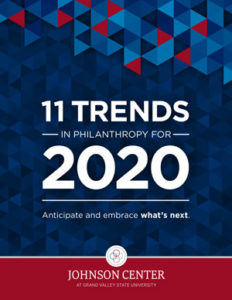Data Science for Social Impact


Adriana Paz takes a closer look in this piece from our 11 Trends in Philanthropy for 2020 report.
 In a world where 294 billion emails are sent daily, and roughly 3.8 million internet searches are performed every minute (Desjardins, 2019b, 2019a), there is no question about the power, importance, and value of data.
In a world where 294 billion emails are sent daily, and roughly 3.8 million internet searches are performed every minute (Desjardins, 2019b, 2019a), there is no question about the power, importance, and value of data.
A huge proportion of the data we have is not purposefully created by users. Rather, it is passively generated and collected as a byproduct of everyday interactions with digital products or services, including mobile phones, credit cards, and social media. This trail of unconventional data reflecting users’ habits or behaviors is called exhaust data, or a digital footprint (Kirkpatrick, 2011). And as the world’s access to new and more sophisticated technology expands, this data is playing a much larger and more complex role in our lives and work.
“[A]s the world’s access to new and more sophisticated technology expands, [exhaust] data is playing a much larger and more complex role in our lives and work.”
Data science is the multi-disciplinary field that emerged from the increasing need to extract knowledge faster and more efficiently from both structured (i.e., organized and formatted) and unstructured data. The scientific methods, processes, and algorithms utilized in data science are not themselves new concepts. The main differences in their contemporary application come from current levels of computing capabilities and the massive amounts of data available for analysis.
Businesses were quick to embrace the power of data and data science to maximize profit. As a sector, they developed and implemented systems to convert their data into usable information to help create new products, optimize services, and reduce costs. The narrative, however, has been different for organizations that work for social change, as limited resources often keep them from taking full advantage of this data revolution.
At the macro level, we have seen about a decade of action aimed at advancing the nonprofit sector’s ability to use data for social good. The term “data scientist” itself only dates to about 2008 (UC Berkeley, 2019). In 2011, the United Nations introduced the term “data philanthropy” at the World Economic Forum to describe and encourage a new form of partnership in which private sector companies share data for public benefit (Kirkpatrick, 2011). Examples of these kinds of partnerships are outlined in the Urban Institute’s report, Data Philanthropy: Unlocking the Power of Private Data for Public Good, and include datasets and projects supported by major digital players, including Google, Twitter, the National Institutes of Health, and others (McKeever, Greene, MacDonald, Tatian, & Jones, 2018).
Simultaneously, organizations like DataKind (launched in 2011) and the Data Science for Social Good Foundation (founded in 2013) have been pioneers in connecting data science talent with social organizations.
“Groups that recognize the need to close the gap between the speed at which data is generated and the amount of effort needed to make that data useful have started to invest in helping nonprofits and governments embrace the use of data science.”
Groups that recognize the need to close the gap between the speed at which data is generated and the amount of effort needed to make that data useful have started to invest in helping nonprofits and governments embrace the use of data science. United Way Worldwide is one such organization: “With effective data insights, we can help companies be much more strategic in investing in the best performing solutions that align to corporate Environmental, Social, and Governance (ESG) priorities,” said William Browning, senior vice president and chief transformation officer (personal communication, December 10, 2019).
At the 2019 World Economic Forum, the Rockefeller Foundation and the Mastercard Center for Inclusive Growth announced an initial commitment of $50 million over five years for Data Science for Social Impact, a transformational model for collaborative philanthropy designed to build and accelerate the use of data science to solve important social challenges (The Rockefeller Foundation, 2019).
The National Science Foundation also announced a commitment in 2019 to invest $30 million in each of its 10 Big Ideas; two of those, Harnessing the Data Revolution and the Future of Work at the Human-Technology Frontier, include workshops and research on Philanthropy Data Analytics (National Science Foundation, 2019).
Individuals and foundations are responding to — and fueling — this trend by investing heavily in academic programs that train students to enter the workforce as data scientists. Together, their contributions amount to hundreds of millions of dollars in gifts (Scutari, 2019). In 2017, Taner Halicioglu, a former engineer at Facebook, alone pledged $75 million to UC San Diego to establish a data science institute. And in 2019, the Quantitative Foundation gifted the University of Virginia $120 million, the largest single gift in the university’s history, to establish the School of Data Science (Hester, 2019).
“Individuals and foundations are responding to — and fueling — this trend by investing heavily in academic programs that train students to enter the workforce as data scientists.”
(These investments could be tangentially tied to philanthropy’s growing interest in supporting workforce development. “Data scientist” was ranked the #1 Best Job in America by Glassdoor for 2019 — the third year running.)
Data science adds depth and nuance to information on human behavior and experiences. New sources of data, new technologies, and new analytical approaches, if applied responsibly, can enable more agile, efficient, and evidence-based decision-making. With the proper data protection measures in place, data science and analytics can contribute to sustainable development and equitable community change.
Still, new trends come with new challenges: major gaps are opening between those with access to data and technology and those with more limited resources. Concepts like artificial intelligence, big data, and machine learning generate enough debate that focus often shifts to methods of doing work instead of reasons why the work should be done in the first place.
Awareness of the biases, weaknesses, and blind spots that affect both individual and communal thinking will help reduce the inequality frontier that threatens to split the world between those who know, and those who do not. But data science must remain a collaborative effort, an ecosystem of shared responsibility where capacity, leadership, tools, data, policy, and governance are given equal importance in order to achieve inclusive and sustainable growth.
Browning, W. (2019, December 10). Interview with United Way Worldwide.
Desjardins, D. (2019a, March 13). What happens in an internet minute in 2019? Retrieved from https://www.visualcapitalist.com/what-happens-in-an-internet-minute-in-2019
Desjardins, D. (2019b, April 17). How much data is generated each day? Retrieved from https://www.weforum.org/agenda/2019/04/how-much-data-is-generated-each-day-cf4bddf29f
Glassdoor. (2019). 50 best jobs in America for 2019. Retrieved from https://www.glassdoor.com/List/Best-Jobs-in-America-LST_KQ0,20.htm
Hester, W. P. (2019, January 18). UVA plans new School of Data Science; $120 million gift is largest in university history. UVAToday. Retrieved from https://news.virginia.edu/content/uva-plans-new-school-data-science-120-million-gift-largest-university-history
Kirkpatrick, R. (2011, September 11). Data philanthropy: Public & private sector data sharing for global resilience [Blog post]. Retrieved from https://www.unglobalpulse.org/blog/data-philanthropy-public-private-sector-data-sharing-global-resilience
McKeever, B., Greene, S., MacDonald, G., Tatian, P. A., & Jones, D. (2018, July 24). Data philanthropy: Unlocking the power of private data for public good. Retrieved from https://www.urban.org/research/publication/data-philanthropy-unlocking-power-private-data-public-good
National Science Foundation. (2019, October 15). Addressing technology and skill gaps in adulthood transitions: Philanthropy data analytics workshop. Indianapolis, IN.
Scutari, M. (2019, May 9). Building a talent pipeline: Who’s giving big for data science on campus? Available at https://www.insidephilanthropy.com/home/2019/5/19/the-current-and-next-big-thing-whos-giving-big-for-data-science-on-campus
The Rockefeller Foundation. (2019, January 22). Mastercard and The Rockefeller Foundation announce ‘Data Science for Social Impact’ with initial $50 million commitment. Retrieved from https://www.rockefellerfoundation.org/about-us/news-media/mastercard-rockefeller-foundation-announce-data-science-social-impact-initial-50-million-commitment
UC Berkley. (2019). What is data science? Retrieved from https://datascience.berkeley.edu/about/what-is-data-science